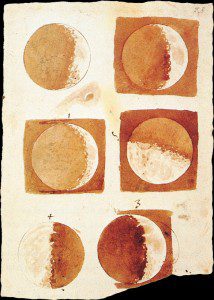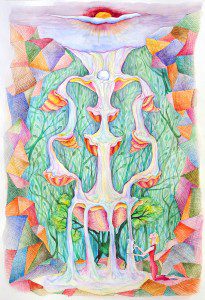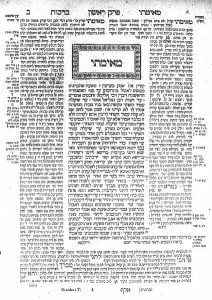I am a member of an ancient, nature-based religion that celebrates the cycles of the harvests. We believe in the supernatural. We count the passing of the year by the cycles of the moon; we dance under it just a few days before it is full and new moons are times for reflections and re-creating ourselves. For a great many of us, environmentalism is a large part of our faith.
We gather to honor The Queen with fire and feasting, singing and ecstatic trance. Our bodies flicker like the flames of candles as the energy of the divine feminine alights upon us.
In the Autumn, heralded by circumambulation and chanting, we beat the leaves off of willow branches even as the branches above us are beginning to loose their foliage. We remind ourselves thereby that Autumn is a time to let what is no longer needed pass away, making room for rebirth.
 When times get tough, really tough, we have our customs. Trinkets to ward off the evil eye, talismans to improve our fertility, incantations from the Kabalah to bring prosperity, rituals of purification to renew us when we feel the touch of death.
When times get tough, really tough, we have our customs. Trinkets to ward off the evil eye, talismans to improve our fertility, incantations from the Kabalah to bring prosperity, rituals of purification to renew us when we feel the touch of death.
We are Jews. We have more in common with Pagans than you could possibly imagine.
Orthodox Jews don’t try to convert people. It’s hard to convert to Judaism. It requires study and initiation, and we are still arguing about lineage. We are a religion of practice with very few unifying beliefs, and the beliefs we have aren’t generally about the spirituality of human-kind, but the ethno-spiritual nature of the Jewish people.
Similarly, I hear Pagans debate about lineage. Beliefs are not uniform. Certain practices may constitute a unifying feature across Paganism, but each sub-group has its own interpretation about how those things should be done. The debate continues, in Pagan circles, about what parts are universal and necessary.
Yet, for reasons beyond my comprehension, Judaism finds itself standing under an umbrella with two expansionist, proselytizing faiths that would, if they could, devour us whole. The decision was made to prevent persecution, but has had worse ramifications for the Jewish people than I can possibly describe.
I am tired, dead tired, of hearing about “Judeo-Christian” values. Any generality about these will, simply by the numbers, result in speaking exclusively about Christians. Standing in a circle painted around us as Abrahamic faiths, Jews are mute and anonymous to the point that we even forget ourselves.
It’s time to blow this popsicle stand.
Before you firmly draw a boundary around Paganism, and exclude us entirely, I have a few questions to put to you. Let us call them “questions of Judeo-Pagan values.”
The Wheel of the Year
“We look to the moon and the sun for the signs of our seasons… people think our holidays are foolish.”

Hearing this, I was instantly furious. Their estimate on the number wasn’t what was so wrong. Wiccans have eight Sabbats and thirteen Esbats for a total of twenty one. What made me so angry was the implication that this was somehow unreasonable.
After all, I celebrate the wheel of the year, too. Twelve days of my year are harvest related holidays, during which time I have observances that require me to take off work, effectively equivalent to Wiccan Sabbats. Then there are 52 weeks in the year, and a Shabbat every week. Not including Hannukah, Purim or Yom Kippur, that’s already 64 days.
If they are going to fault you for 20, if they win, my co-religionists and I are surely next. In a 24-7 society where nothing is sacred, any attempt to set aside sacred space or sacred time is automatically under siege.
I have had to quit jobs, or have had my hours cut so drastically that I may as well have been fired, because I was celebrating non-Christian holidays. I see Wiccans and Pagans forced to observe their sacred days on the nearest weekend, or not at all, because they are afraid to ask for days off of work.
We are fighting the same fight.
Monotheism and Polytheism
“I looked up the dictionary definitions, but I don’t fit a category.”
Jews may have pioneered the field of monotheism, saying “Shema Yisroayl Hashem Elokeinu, Hashem Echad,” but the dictionary definition no longer fits what Orthodox Jews mean by the word.
If you include Kabalah in any aspect of your practice, if it informs the way you look at whatever mythology you happen to be looking at, if it shapes your worldview in any significant way, you already have more in common with Orthodox Jews, theologically, than Christians do.
Many who identify as Pagans aren’t hard polytheists, or monotheists, but fall somewhere in the mushy middle, believing in some sort of unity, and some number of manifestations thereof.
There are Pagans, of course, who are hard polytheists. I notice, though, that some are strongly considering dispensing with the label “Pagan,” largely because just as Jews are outnumbered and voiceless in a sea of “Abrahamic faiths” that misrepresent them, polytheists are frustrated about being represented by people who are, by and large, not hard polytheists.

If you listen to Jews talk about divinity long enough, you’ll realize that standard ideas of gender and number sort of fall apart in our (incredibly diverse and pluripotent) theology, as do confines of time and space. It’s more complex than just “one” or “many,” “male” or “female,” or even “before” or “after.” Our deity is, “a spark of impenetrable darkness which split and did not split its aura.” (Zohar, Bereshit)
To fully explain this, I’d really need to write a several hundred page book. However, I don’t have time to write that, nor do you have time to read it. An analogy will have to do.
When I write a story with many characters, I am plural. The old man, the young woman and the precocious child are all me. They are all who I would be if I was in that set of circumstances, at that stage in my life. The characters in the story see one another, interact with one another. They may even interact with supernatural creatures that I put there, but those supernatural creatures are all me, too. That doesn’t mean that I’m not an individual. It doesn’t mean I’m the only author there is. It doesn’t mean that my book has to have the same metaphysical rules as any other book. In our analogy, I am the Hebrew God. The book is the Hebrew egregore. The people reading the book are Jews. Their minds are, for the time that they are reading, fully immersed in that imaginative world, but completely cognizant that I am the author. The characters in the book are the names of God, aspects of God, angels and heroes of the mythos.
There are many names of this Jewish divinity. There are many personalities, too. They are all One. She/He is plural. If you are relying on non-Jews to tell you who the Deity is, I assure you, you will be mislead about how Jews think about that deity. Perhaps, then, this singleplural, pluralsingle, henotheistic, aniministic, panentheistic, gosh it’s just too hard to explain really, weebly-wobly-deity-weity STUFF is a Judeo-Pagan thing, too?
As well, the Jewish umbrella allows for beliefs that are animistic (the Moon talks to God), henotheistic (angels are lesser deities, deities we don’t directly worship, but deities), panentheistic, mystical or rational. It allows for a plurality of beliefs about the after-life which include reincarnation, eternal non-physical existence, or no after-life at all.
Leaving room to think. Leaving room for people to decide for themselves how the metaphysical universe works, and being united by common practices so as to allow for many beliefs without disturbing unity. Allowing for unifying practices to be interpreted in many different ways, defining them broadly so as to create freedom in that, as well. Is that a Judeo-Pagan value?
What about the need to see the whole of divinity as plural gendered? There are aspects of our deity that are male (Ayl), female (Adonai), hermaphroditical (Tzvaot) or genderqueer (YHVH). Some of them swap genders depending on circumstances, becoming fully male, or fully female (YHV). Do you not likewise value the representation of multiple genders within the Divine? Might this also be a Judeo-Pagan value?
Ethnic Religions and Expansionist Faiths
“My truth doesn’t have to be your truth.”
Orthodox Jews have an extremely ethnocentric view. The laws and taboos have nothing to do with non-Jews. Why would they? The Torah is our cultural book, and it is full of laws for Jews. In order to join Judaism, you need to be initiated, essentially acquiring Judaism as your ethnic identity. When a proselyte joins Judaism –after years of study and an extensive investigation examining their ability to keep the traditions — it is considered that our ancestors become their ancestors. Only by spiritually sharing these ancestors can a person become Jewish. Only by having Jewish ancestry can you worship the ancestral deity.
Hellenic polytheism, Celtic Reconstructionism, British Traditional Wicca, Babylonian Polytheism, Kemetic Orthodoxy. These are faiths that don’t speak too much about what is universally true, but rather, focus on what is true and right for people who personally, mystically identify with those cultures. Jew-daism is not different.
Expansionist faiths, on the other hand, believe that they have the truth, the really real truth, the literal truth. Anyone who does not agree with them is wrong. Everyone, once they “wake up” will obviously convert, since they are offering metaphysical certitude. All other religions are “superstitious.” They do not mean to speak for themselves, or their culture, they mean to speak for all of humanity. Many sects of Christianity and Islam have this “absolute human truth” thing going on at the core of their faith. This is not a Jewish idea, however. It’s not a Pagan idea, either. It disturbs me that I am beginning to see traces of this in some sects of Judaism. If my reading of recent articles in your community is any indication, you are fairly disturbed by it when it crops up in your community, too.
The instant Jews start talking about beliefs in terms of the world, and not the Tribe, what is right for humans, rather than what is right for those of Jewish faith, how to get non-Jews to join, rather than figuring out how to entice Jews to stay, they realize that they must abandon our “superstitious” ideas that may not apply to all people from all cultures. These ideas, of course, are at the core of Orthodox practice.
Reform Jews, like Christians, believe that Judaism should be universal. They have the belief, like Christians, that Judaism should be based on specific beliefs, rather than practices and consequently, don’t know very much about the tribal customs, on the whole. They are leaking membership, and not seeing significant growth. They are probably the only Jews you know about. They say that their religion is just like Christianity, and they are correct. Unless they reject faith-based notions about Judaism, and get back to the ethnic roots of the religion, they won’t exist in a hundred years. Yet, they are terrified that by being different than Christianity, they won’t fit into “Modern” (read:Christian) society. Christians tell them what the “Old Testament Laws” demand of them, and how unreasonable it all is, little realizing that the central book of Jewish Law (Hallacha) isn’t the Tenakh, but the Talmud.
 Orthodox Judaism is not primarily concerned with issues of universal truth (though you have to feel like you know how the world works to practice magic) or universal morality. Rather, it is concerned with being true to our ancient tribal customs, which we are proud to have continuously changed and updated to suit our needs, rather than mindlessly following whatever laws we think people followed in the stone age. Modern, ancient, changing, unchanging, it matters little, it’s ours. It’s not ours a thousand years ago, it’s ours in this very moment, as I sit here typing. We want only the right to follow our cultural religion without being discriminated against. I suspect the desires of Pagans are not different.
Orthodox Judaism is not primarily concerned with issues of universal truth (though you have to feel like you know how the world works to practice magic) or universal morality. Rather, it is concerned with being true to our ancient tribal customs, which we are proud to have continuously changed and updated to suit our needs, rather than mindlessly following whatever laws we think people followed in the stone age. Modern, ancient, changing, unchanging, it matters little, it’s ours. It’s not ours a thousand years ago, it’s ours in this very moment, as I sit here typing. We want only the right to follow our cultural religion without being discriminated against. I suspect the desires of Pagans are not different.
Is respecting the right of small, ethnically-based religious traditions to worship the Gods of their genetic or adopted Ancestors a potential Judeo-Pagan value? Might we also be able to say that it isn’t one to be expansionist and declare that your truth is the best and only truth?
What I’m Suggesting
I’m not suggesting that Judaism is a kind of Paganism, actually. I don’t know how I can suggest that, when really, Paganism has yet to acquire a definition that all Pagans are satisfied with.
What I am suggesting is that your relations with other religions outside of the Pagan umbrella are important, and they can’t all be negative.
The next time you write about what “Abrahamic” faiths believe or do, consider whether your comments sincerely apply to each and every Abrahamic faith. Does it apply to the Sufi? The Jews? The liberal sects of Christianity? Do you know enough to be able to say whether it does or not? If you are mad at mainline Christianity, maybe your beef ends there. Does a particular religion have to be incorrect for yours to be correct?
If you share even one of those things I mentioned with my particular idiom of Judaism, you might find that there are many other points of connection about which you were previously unaware. Might there really be Judeo-Pagan values? Christo-Pagan values? Even Islamic-Pagan values? By finding commonalities between Pagan and non-Pagan religions, you might just find allies. Fair-minded folk of other faiths might take up your cause and help you begin, in small part, to step out into the light of a broader, better world: one where you participate on equal footing with all other faiths.
 Aliyah Bat Stam is a kabalist, Jewish educator, ceremonial magician and Torah Observant Jewitch. She exists primarily for the purpose of irritating people who like to put things into boxes (literal or physical), and secondarily for the purpose of making people of all ages think. In her spare time, she likes to study Greek and Hebrew mythology, and jump up and down shouting at the guy on the O.U. Daf Yomi recordings. For more of Aliyah’s writing, check out her blog, Jewcraft.
Aliyah Bat Stam is a kabalist, Jewish educator, ceremonial magician and Torah Observant Jewitch. She exists primarily for the purpose of irritating people who like to put things into boxes (literal or physical), and secondarily for the purpose of making people of all ages think. In her spare time, she likes to study Greek and Hebrew mythology, and jump up and down shouting at the guy on the O.U. Daf Yomi recordings. For more of Aliyah’s writing, check out her blog, Jewcraft.

















